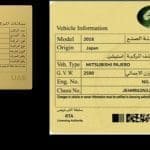

Navigating Mawaqif Resident Permits in Abu Dhabi
Understanding the Mawaqif Resident Permit: A Guide for Abu Dhabi Car Owners
If you’re a resident of Abu Dhabi and own a car, navigating the city’s parking system is essential. The Mawaqif Resident Permit is a crucial tool for this, and understanding how to obtain and utilize this permit can save you from a lot of parking hassles. Here’s a detailed guide that will walk you through everything you need to know about securing and making the most of your Mawaqif Resident Permit.
What is the Mawaqif Resident Permit?
The Mawaqif Resident Permit is a parking permit system implemented by the Department of Transport in Abu Dhabi. It allows residents to park their vehicles in designated areas near their homes. This system is part of a broader initiative to regulate parking in the city, ensuring that residents have priority in densely populated neighborhoods.
Eligibility for the Mawaqif Resident Permit
To be eligible for a Mawaqif Resident Permit, you must prove that you are a legal resident living in a qualifying area. The required documents typically include a copy of your tenancy contract, Emirates ID, and vehicle registration that matches your residence address. Each household may be eligible for more than one permit, depending on the sector regulations.
How to Apply for the Permit
Applying for the Mawaqif Resident Permit involves a straightforward online process. First, visit the official Mawaqif portal. Once there, create an account, and fill in the necessary details about yourself and your vehicle. You will need to upload the required documents as digital files. After submission, you can track your application status through the same portal. The approval process usually takes a few days.
Costs Involved
The cost of a Mawaqif Resident Permit varies depending on the zone and the number of vehicles registered at a single address. The first vehicle often has a lower fee, with subsequent vehicles incurring higher charges. It’s advisable to check the latest fee structure on the Mawaqif website to budget accordingly.
Renewing Your Mawaqif Resident Permit
Remember, the Mawaqif Resident Permit is not automatically renewed. Residents must reapply annually to maintain their parking privileges. The renewal process is similar to the initial application, and residents receive reminders to ensure they do not miss the deadline.
Benefits of Holding a Mawaqif Resident Permit
With a Mawaqif Resident Permit, you can enjoy several benefits. Primarily, it allows you to park your car in designated spots close to your residence, which can be a significant advantage in crowded city sectors. This dedicated parking can save you time and reduce the stress of finding safe parking spots daily.
Tips for Maximizing Your Permit
To make the most of your Mawaqif Resident Permit, always ensure your permit is clearly displayed on your vehicle to avoid penalties. Additionally, be aware of the parking regulations in your area to avoid fines and towing. Regularly check for any changes in parking policies or zone timings which are typically announced on the Mawaqif website or through public notices.
Troubleshooting Common Issues
Sometimes, residents face issues such as receiving fines despite having a valid permit or problems during the application process. In such cases, it is essential to contact Mawaqif customer support directly. They offer assistance through their hotline and email, which can help resolve any discrepancies or technical issues swiftly.
The Role of Car Advertising in Abu Dhabi
Interestingly, while managing parking needs with a Mawaqif Resident Permit, residents of Abu Dhabi can also consider the benefits of car advertising. Vehicle wraps and ads can be an excellent way to generate additional income or promote businesses effectively within the city. As you drive around the city, your car can serve as a mobile billboard, reaching thousands daily.
Why Consider Car Advertising?
Car advertising offers a unique marketing opportunity that can be particularly effective in a bustling city like Abu Dhabi. Whether you own a Toyota Camry or any other vehicle, utilizing car ads can help you tap into a mobile audience, enhancing brand visibility and recognition.
Ensuring Compliance with Local Regulations
When opting for car advertising, ensure that it complies with local regulations. Abu Dhabi has specific guidelines regarding the size and type of advertisements that can be displayed on vehicles. Adhering to these rules is crucial to avoid legal issues or fines.
Conclusion
Navigating the complexities of Abu Dhabi’s urban environment requires a good understanding of local regulations, whether it’s parking or advertising. The Mawaqif Resident Permit is an invaluable asset for residents, offering convenience and peace of mind. Additionally, leveraging opportunities like car advertising can provide financial benefits and contribute to a dynamic advertising landscape in the city. Remember, staying informed and compliant are the keys to making the most out of your driving and parking experience in Abu Dhabi.
Can I transfer my Mawaqif Resident Permit to a new vehicle if I buy a new car?
Yes, you can transfer your Mawaqif Resident Permit to a new vehicle. You need to update your vehicle details on the Mawaqif portal and provide documentation for your new car, such as the vehicle registration. The permit will then be transferred to your new vehicle once the changes are approved.
What happens if I move to a new address within Abu Dhabi? Do I need a new Mawaqif Resident Permit?
If you move to a new address within Abu Dhabi, you will need to apply for a new Mawaqif Resident Permit corresponding to your new residence zone. You must update your address and submit a new tenancy contract and other required documents through the Mawaqif online portal.
Are there any exceptions for visitor parking with a Mawaqif Resident Permit?
Mawaqif Resident Permits are specifically for residents’ vehicles and do not cover visitor parking. Visitors need to use the paid parking spaces or obtain a temporary visitor’s permit if they plan to park frequently in the area.
How long does it take to process a Mawaqif Resident Permit application?
The processing time for a Mawaqif Resident Permit application can vary, but it typically takes a few days to a week. During peak periods or if there are issues with the application, it may take longer. Applicants can track the status of their application online through the Mawaqif portal.
Is there a penalty for late renewal of a Mawaqif Resident Permit?
Yes, failing to renew your Mawaqif Resident Permit before its expiry date can result in penalties. You might be unable to park in the designated residential parking zones until your permit is successfully renewed, and you may also be subject to fines if you park without a valid permit.
Check our frequently asked questions page
Add a comment Cancel reply
Comments (0)
Categories
- Abu Dhabi (2)
- Accidents (3)
- Car Registration (1)
- GCC Specs (3)
- Imported (3)
- Sell a car (1)
- Specs (1)
- Uncategorized (2,852)
Recent Posts
Related posts


Hassle-Free Way to Buy My Car Near Me in Abu Dhabi

Best Places to Get Cash for My Car in the UAE












